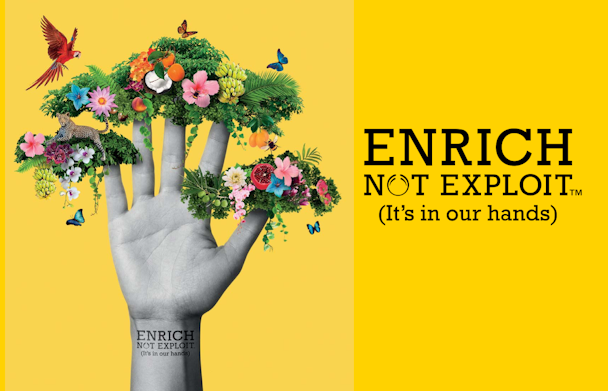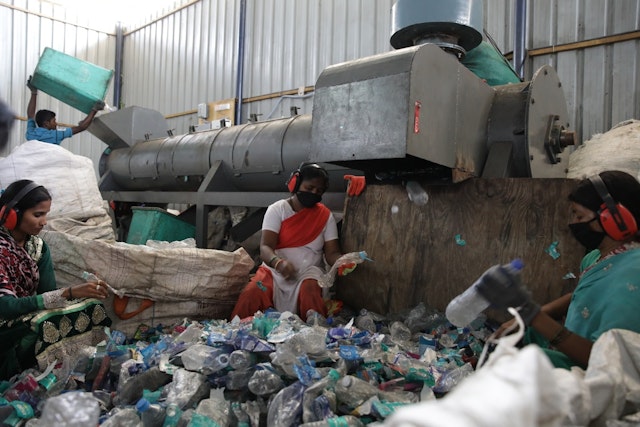Body Shop outlines plans to improve 'slow' progress on green goals
The Body Shop has shifted the goalposts on some of its ambitious 2020 corporate social responsibility targets after its international director of corporate responsibility and campaigns admitted that “not everything had gone to plan” on its five-year sustainability programme.

Body Shop's 5-year sustainability strategy
In 2016 The Body Shop declared its brand purpose would be centred on programme called ‘Enrich Not Exploit’ that aimed to deliver against 14 goals to enrich people, its products and the planet within just five years. But progress has been slower than expected – especially on its work on its plastic packaging innovation targets.
With one year left to hit its ambitious targets, The Drum spoke to Pins Brown, head of ethical and sustainable sourcing at The Body Shop about its revamped approach and new partnership with Indian organisation ‘Plastics For Change’ will help it get back on course.
Ambitious ‘Enrich Not Exploit’ project
In 2016, shortly before it was sold by L’Oreal to ethical Brazilian brand Natura, The Body Shop declared it wanted to get back to its green roots, reinventing itself as a sustainable pioneer that would become “the most ethical and truly sustainable global business” – a goal it aimed to achieve in only a five-year period.
But just a year later it issues a report stating that while the brand had made notable progress on biodiversity protection and community trade, this hadn’t been matched across energy applications where it had made slower gains in green power, energy efficiency and sustainable packaging.
When the five-year sustainability program was launched three years ago, The Body Shop promised to develop and deliver new sustainable packaging innovations by 2020 but it failed to deliver one in 2017 because “some promising concepts did not meet standards during tests.”
At the time, director of research and innovation Neil Watson said: “[This] is frustrating, but innovation takes time. We continue to face the challenge that different countries have different recycling infrastructures and one size doesn’t fit all.”
Meanwhile, progress against its interim goal to ensure 63% of packaging was free from fossil fuels fell flat, with only 55% avoiding non-renewable sources, despite its goal to make all packing 70% free by 2020.
Where is the Body Shop now on its sustainable packaging now?
After admitting its sustainable packaging innovations “had not advanced as quickly as we hoped” The Body Shop created a cross-functional team – the Packaging Transformation Committee – to ensure it met its targets.
It recently forged a partnership with the Indian organisation ‘Plastics for Change’ to collect fair trade plastic from Bengaluru in India as part of its Community Trade programme, which will deliver the first of it’s the three sustainable packaging innovations it promised to deliver by 2020.

Through the ‘Plastics For Change’ partnership, Brown said it aims to support up to 2,500 waste-pickers over the course of three years in India, collecting 250 tons of waste plastic which it will recycle into three million shampoo and conditioner bottles.
Brown added that The Body Shop has also promised to buy the plastic in exchange for “a fair price, a predictable income and an opportunity to help improve their lives.”
Of the three million recycled bottles produced, 15% of the plastic will have been collected from these Community Trade sources with the remainder coming from European sources.
Brown said by 2021 it wants to use 100% of Community Trade recycled plastic across all of its PET plastic packaging. Currently, around half of The Body Shop's packaging uses PET - one of the most commonly used plastics in consumer products - but by 2020 it wants that figure to be 75%.
Meanwhile, the ambition to have 70% of product packaging free from fossil fuels by 2020 was “a challenging target” so it is now “looking at 100% of product packaging being free from fossil fuels by 2025,” Brown confirmed.
Though it’s been a challenging start to the Enrich not Exploit project, The Body Shop hopes that by 2030 it will have “completely closed loop system for all our packaging,” said Brown, which will “recycle or re-purpose 100% of its packaging mostly back into packaging or shop fixtures.”

